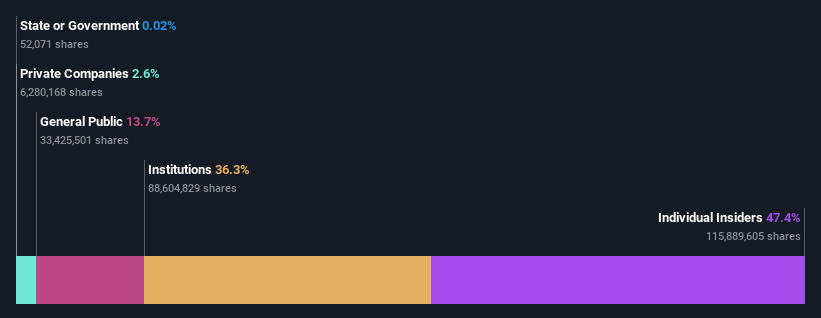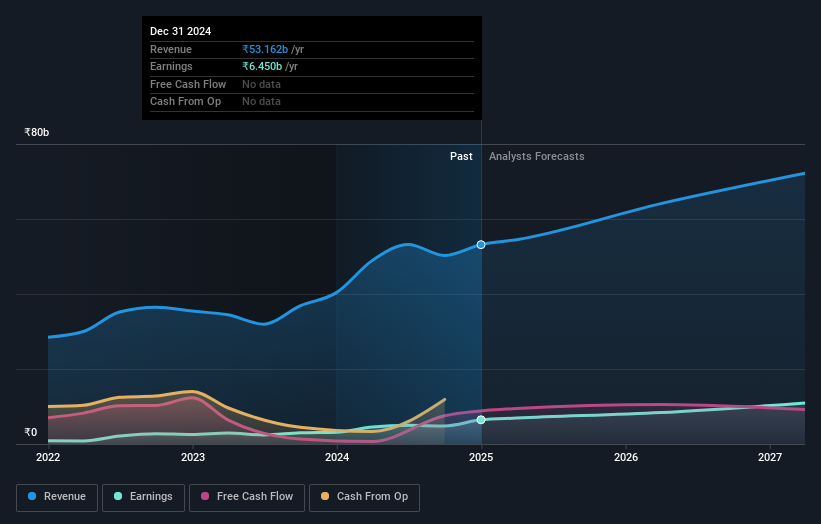- India
- /
- Real Estate
- /
- NSEI:BRIGADE
Following recent decline, Brigade Enterprises Limited's (NSE:BRIGADE) top shareholder Top Key Executive Mysore Jaishankar sees holdings value drop by 11%

Key Insights
- Brigade Enterprises' significant insider ownership suggests inherent interests in company's expansion
- The top 10 shareholders own 52% of the company
- Institutions own 36% of Brigade Enterprises
If you want to know who really controls Brigade Enterprises Limited (NSE:BRIGADE), then you'll have to look at the makeup of its share registry. We can see that individual insiders own the lion's share in the company with 47% ownership. That is, the group stands to benefit the most if the stock rises (or lose the most if there is a downturn).
And following last week's 11% decline in share price, insiders suffered the most losses.
Let's delve deeper into each type of owner of Brigade Enterprises, beginning with the chart below.
Check out our latest analysis for Brigade Enterprises

What Does The Institutional Ownership Tell Us About Brigade Enterprises?
Institutional investors commonly compare their own returns to the returns of a commonly followed index. So they generally do consider buying larger companies that are included in the relevant benchmark index.
As you can see, institutional investors have a fair amount of stake in Brigade Enterprises. This suggests some credibility amongst professional investors. But we can't rely on that fact alone since institutions make bad investments sometimes, just like everyone does. When multiple institutions own a stock, there's always a risk that they are in a 'crowded trade'. When such a trade goes wrong, multiple parties may compete to sell stock fast. This risk is higher in a company without a history of growth. You can see Brigade Enterprises' historic earnings and revenue below, but keep in mind there's always more to the story.

Brigade Enterprises is not owned by hedge funds. Our data suggests that Mysore Jaishankar, who is also the company's Top Key Executive, holds the most number of shares at 14%. When an insider holds a sizeable amount of a company's stock, investors consider it as a positive sign because it suggests that insiders are willing to have their wealth tied up in the future of the company. For context, the second largest shareholder holds about 11% of the shares outstanding, followed by an ownership of 6.6% by the third-largest shareholder. Interestingly, the third-largest shareholder, Nirupa Shankar is also a Member of the Board of Directors, again, indicating strong insider ownership amongst the company's top shareholders. In addition, we found that Pavitra Shankar, the CEO has 0.8% of the shares allocated to their name.
We did some more digging and found that 10 of the top shareholders account for roughly 52% of the register, implying that along with larger shareholders, there are a few smaller shareholders, thereby balancing out each others interests somewhat.
While studying institutional ownership for a company can add value to your research, it is also a good practice to research analyst recommendations to get a deeper understand of a stock's expected performance. Quite a few analysts cover the stock, so you could look into forecast growth quite easily.
Insider Ownership Of Brigade Enterprises
The definition of an insider can differ slightly between different countries, but members of the board of directors always count. Management ultimately answers to the board. However, it is not uncommon for managers to be executive board members, especially if they are a founder or the CEO.
Insider ownership is positive when it signals leadership are thinking like the true owners of the company. However, high insider ownership can also give immense power to a small group within the company. This can be negative in some circumstances.
Our most recent data indicates that insiders own a reasonable proportion of Brigade Enterprises Limited. It is very interesting to see that insiders have a meaningful ₹114b stake in this ₹240b business. Most would say this shows a good degree of alignment with shareholders, especially in a company of this size. You can click here to see if those insiders have been buying or selling.
General Public Ownership
The general public-- including retail investors -- own 14% stake in the company, and hence can't easily be ignored. While this size of ownership may not be enough to sway a policy decision in their favour, they can still make a collective impact on company policies.
Next Steps:
While it is well worth considering the different groups that own a company, there are other factors that are even more important.
I like to dive deeper into how a company has performed in the past. You can access this interactive graph of past earnings, revenue and cash flow, for free.
But ultimately it is the future, not the past, that will determine how well the owners of this business will do. Therefore we think it advisable to take a look at this free report showing whether analysts are predicting a brighter future.
NB: Figures in this article are calculated using data from the last twelve months, which refer to the 12-month period ending on the last date of the month the financial statement is dated. This may not be consistent with full year annual report figures.
Valuation is complex, but we're here to simplify it.
Discover if Brigade Enterprises might be undervalued or overvalued with our detailed analysis, featuring fair value estimates, potential risks, dividends, insider trades, and its financial condition.
Access Free AnalysisHave feedback on this article? Concerned about the content? Get in touch with us directly. Alternatively, email editorial-team (at) simplywallst.com.
This article by Simply Wall St is general in nature. We provide commentary based on historical data and analyst forecasts only using an unbiased methodology and our articles are not intended to be financial advice. It does not constitute a recommendation to buy or sell any stock, and does not take account of your objectives, or your financial situation. We aim to bring you long-term focused analysis driven by fundamental data. Note that our analysis may not factor in the latest price-sensitive company announcements or qualitative material. Simply Wall St has no position in any stocks mentioned.
About NSEI:BRIGADE
Brigade Enterprises
Provides real estate development, leasing, and related services in India.
Solid track record with excellent balance sheet.
Similar Companies
Market Insights
Community Narratives




